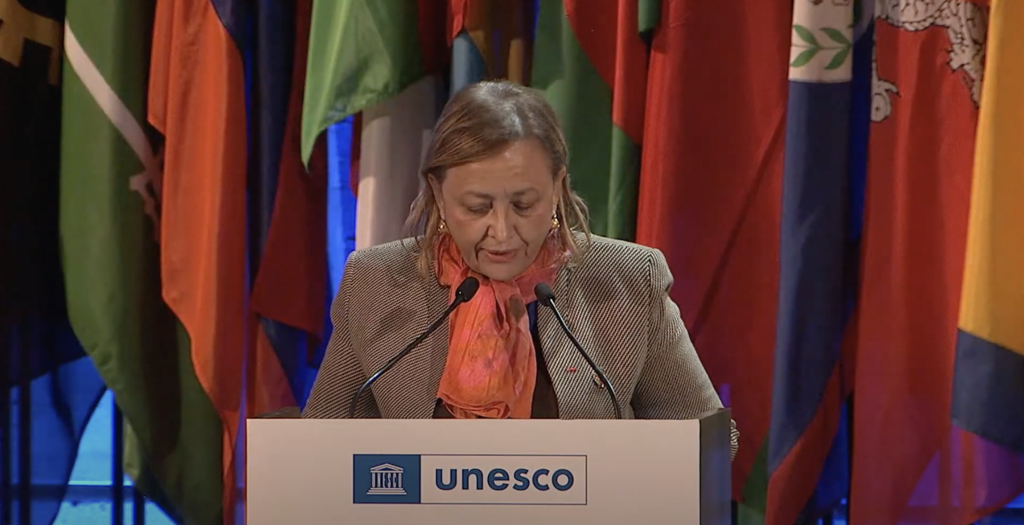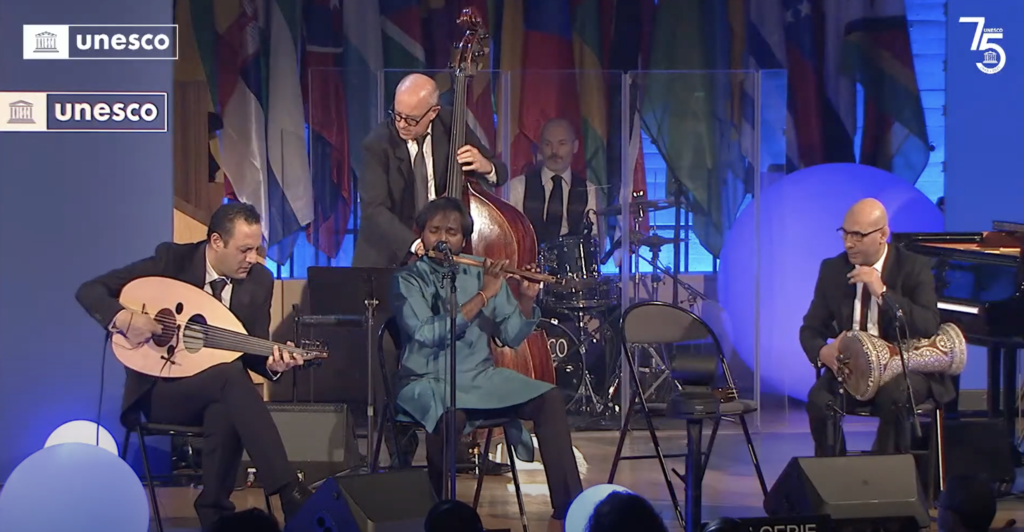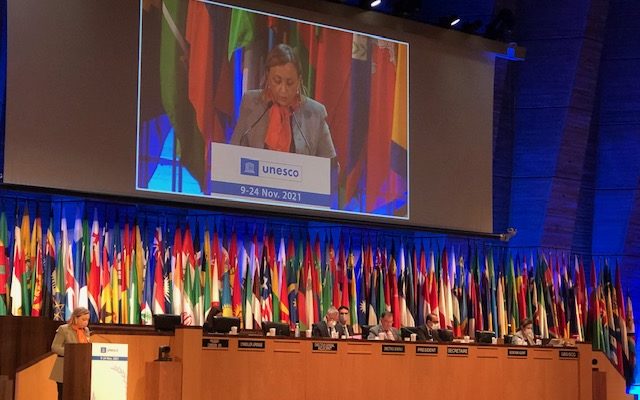Blog by Evelyne Para, SI United Nations Representative at UNESCO.
9 November 2021 saw the Opening of the 41st session of UNESCO’s General Conference in Paris. For two weeks, delegates from 193 Member States, several dozen NGO representatives and experts worked in plenary sessions or in specialist Commissions, and debated current and emerging issues in order to continue facing the challenges of our time.
Plenary sessions and debates
Under the chairmanship of Mr. Santiago Irazabal Mourao (Brazil), the Bureau of the General Conference was responsible for ensuring the smooth running of the 41st session, and the speaking times were scrupulously respected for the general policy statements of the Member States (6 minutes for each Member State), and also for interventions by NGOs having obtained the right to speak (3 minutes for each NGO).
During the debates, all the speakers testified to the need to bring about a different world based on a politics of humanity. With the COVID-19 pandemic, balances that we thought had been achieved have proved to be extremely and worryingly fragile. Fractures to which we had become accustomed were brought to light, and they widened, questioning the meaning of our common humanity.
The speakers stated their willingness to continue to engage together and emphasised the need for multilateralism to be more tangible, and therefore more effective. They also pointed out UNESCO’s unique value: the establishment of reliable data to document, inform and guide the public policies of States, in the diversity of international experiences and with the support of research, so that these public policies are adapted to the challenges of the 21st century world.
Priorities were also identified for a draft medium-term strategy in order to meet several challenges: the educational challenge, the challenge to our climate, the challenge of social cohesion and peace, and the challenge of mastering technology at the service of humanity, but also to make the voices of young people and women heard.
The voice of Soroptimist International has been heard
I had the honour to speak on behalf of Soroptimist International to present the goals of our NGO and our vision for the future. I took the opportunity to demonstrate our experience in the field, and by defending multilateralism with conviction, I recalled that we deploy projects carried out in partnership with local decision-makers from States, other NGOs and associations, and many other actors.

Evelyne Para speaking at the 41st Session of the UNESCO General Conference.
During my intervention, I explained that, “More than 4,000 projects are carried out each year by Soroptimist International all over the world. They make it possible to decompartmentalise, federate and open new doors, in many areas: education, women’s empowerment, fight against root causes of many inequalities or vulnerabilities, health and sustainable development, promotion of an open science and an ethics of Artificial Intelligence, transition to digital and green societies.
This is why we call for the strengthening of this partnership between Member States, UNESCO Services whose resources are precious to us and all NGOs, in a real spirit of inclusion of local actors, in order to promote the SDGs that we all have at heart to achieve by 2030.”
Ceremonies with emotion
The 41st session of UNESCO’s General Conference was also marked by moments of great emotion: the re-election of Audrey Azoulay, and the celebration of 75 years of UNESCO. Azoulay expressed her gratitude for the renewed confidence which was clearly expressed in her, and for the support coming from all regions of the world: “I have found support but also inspiration, over the past four years, in your diversity, in your rich histories, in your cultures, in our discussions.” The key takeaway being “unity” – a unity which is not uniformity but which is rather a shared awareness of responsibilities.
26 Heads of State and Government, delegations from 193 Member States, as well as an impressive list of artists, singers and musicians from all over the world celebrated UNESCO’s 75th anniversary during a special ceremony on 12 November.

Screenshot of the UNESCO75 celebration event.
Fruitful work in various Commissions
During this General Conference, six Commissions met regularly to finalise certain recommendations or action strategies, and lay foundations for several projects:
ED Commission (Education)
Realisation of “The Futures of Education”, recommendations and new teaching programs, implementation of reports;
SC Commission (Exact and Natural Sciences and Intergovernmental Oceanographic Commission):
International Days of Biosphere Reserves and Biodiversity, glacier monitoring, recommendation on open science;
SHS Commission (Social and Human Sciences):
Recommendation on the ethics of Artificial Intelligence, World Future Day, International Day of Conscience;
CLT Commission (Culture):
Various UNESCO conventions in the field of culture;
CI Commission (Communication and Information):
Implementation of the results of the World Summit on the Information Society, International Program for the Development of Communication, World Press Freedom Day;
APX Commission:
Coordination and monitoring of action to implement the priority Gender Equality, International Women’s Day in multilateralism.
In conclusion, the 41st session of UNESCO’s General Conference made it possible to define strategic orientations of this United Nations for the next two years. The reports discussed during certain Commissions, and which will be adopted definitively at the closing of the Conference, will be discussed in my future blogs.

